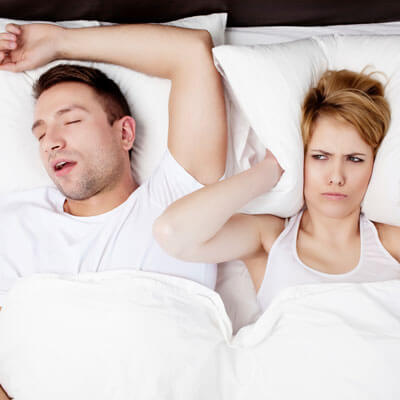Snoring and Sleep Apnoea Appliances at Wellness Dental Bronte
Certain types of sleep apnoea are due to an obstruction in the airway, caused by soft tissues at the back of the mouth. In such cases, it’s possible to help manage or treat the sleeping disorder with a protective mouthguard or snoring device.
Oral sleep appliances are an effective alternative to bulky CPAP machines. Not only are they smaller and easier to clean, they’re less obstructive and more discreet. Your family or roommates won’t complain of the noise, because there are no electrical machines or hoses to force air into your lungs.
How Oral Sleep Appliances Work
 Sometimes called “mandibular advancement devices”, oral sleep mouthguards work by positioning your lower jaw in a slightly protruded position. This movement brings the tongue a bit forward and prevents collapse of the soft tissues like your soft palate and tonsils. As a result, you can enjoy a naturally enlarged airway where oxygen isn’t restricted.
Sometimes called “mandibular advancement devices”, oral sleep mouthguards work by positioning your lower jaw in a slightly protruded position. This movement brings the tongue a bit forward and prevents collapse of the soft tissues like your soft palate and tonsils. As a result, you can enjoy a naturally enlarged airway where oxygen isn’t restricted.
Oral sleep mouthguards are unobtrusive and quiet to the people around you, making them easier to use. Their smaller size makes them an ideal alternative to CPAP, especially if you prefer sleeping in different positions or travel frequently.
Don’t Ignore the Snore!
If you or your partner has a habit of chronic snoring or teeth grinding, you might be more worried about the side effects like headaches or broken dental work. But the truth is that snoring is a common symptom of sleep disordered breathing conditions like obstructive sleep apnoea.
When you snore or have a sleeping disorder, it means your body isn’t getting enough air into your lungs. As such, there’s less oxygen to flow through your blood and to your brain. Over the course of several years, sleep apnoea can lead to dangerous, long-term damage to your brain and body. It’s not simply about getting a good night’s rest.
Symptoms of Sleep Apnoea
Do you wake up in the morning already feeling tired? Does your sleep partner notice you grinding your teeth during the night? If you get up with your jaws feeling sore or shut tightly together, you could have a sleeping disorder. Some of the most common symptoms to watch for include:
- Snoring
- Teeth grinding
- Stress
- Flat, worn teeth
- Anxiety
- Headaches
- Earaches
- Large neck circumference
- High blood pressure
- Depression
- Neck and shoulder pain
Sleep Apnoea Testing
At Wellness Dental Bronte, we can screen for oral symptoms of sleep apnoea to let you know if further testing is necessary. In some cases, it’s possible to get a take home sleep study ordered, so that you can get a formal diagnosis without staying overnight in a lab.
What’s Involved in Getting a Sleep Guard?
To have an oral sleep appliance made, all we need is a mould of your upper and lower teeth. From there, one of our Australian labs makes the mouthpiece and it’s ready to use within a short period of time. Some people see results the first night of use.
See a Sleep Dentist
If you suspect that you have a sleeping disorder such as snoring or obstructive sleep apnoea, contact us for a Sleep Apnoea Bronte consultation today!
CONTACT US
* Any surgical or invasive procedure carries risks. Before proceeding, you should seek a second opinion from an appropriately qualified health practitioner.

